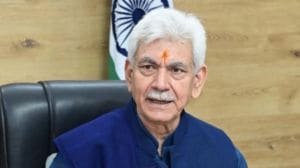Join us, Saarc to Afghanistan
The diplomatic wrangle over the inclusion of Afghanistan into SAARC, after Nepal linked this to the Chinese request for observer status, end...

The diplomatic wrangle over the inclusion of Afghanistan into SAARC, after Nepal linked this to the Chinese request for observer status, ended on a positive note today, with all member states agreeing to extend an invite to Afghanistan to become the eighth member of the South Asian body.
Welcoming the decision, Prime Minister Manmohan Singh said: ‘‘This is an appropriate recognition of the long-standing ties of culture and history Afghanistan shares with us.’’
The SAARC leaders, however, decided not to forge a memorandum of understanding — as suggested by India — with China and instead finalise a set of criteria for observers and dialogue partners at the earliest. The matter will be taken up by the SAARC Council of Ministers when it meets next.
Singh said the council of ministers are expected to firm up the modalities and guidelines for such a status soon.
He pointed out that even Japan had expressed a similar interest. Both these cases will be taken up once the criteria for such status is decided.
Another issue that got attention was terrorism. The leaders agreed that home ministers of SAARC countries will meet annually to exchanges notes.
Expressing serious concern over threats posed by terrorism, the declaration underlined that ‘‘there should be no double standards’’ in combating the scourge.
But that did not stop the leaders on agreeing to liberalise the visa regime, which will essentially expand the existing category of persons who can be give a SAARC sticker for travel to any member country. The new categories will include journalists with a minimum experience as well as businessmen.
Further, three agreements were signed at the summit. One is an agreement on avoidance of double taxation, the other is on customs cooperation and the third is on establishment of a SAARC Arbitration Council.
The leaders affirmed that all efforts should be made to abide by the deadline of operationalising SAFTA by January 2001. The couple of key issues to be settled in this regard are the rules of origin that will define the list of goods which can be traded under the agreement and the formula for compensating the Least Developed Countries of the grouping.
The Prime Minister said he hoped the outstanding issues which ‘‘separate us from final agreement on SAFTA’’ are resolved expeditiously. The Committee of Experts is slated to meet before November 30 to resolve these issues.
According to Singh, the declaration adopted at the 13th SAARC Summit was ‘‘forward looking’’ and included a number of substantive proposals.
Some of the Indian proposals, like the offer for a liberal open skies arrangement in the region and the idea of setting up a South Asian University have been accepted.
The group also decided to establish a SAARC Poverty Alleviation Fund.






- 01
- 02
- 03
- 04
- 05

























